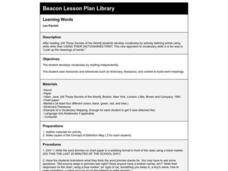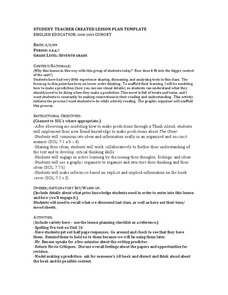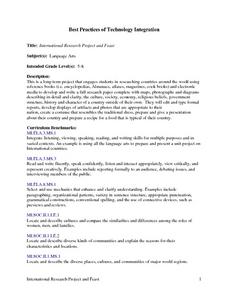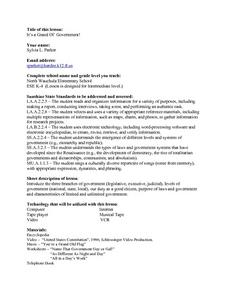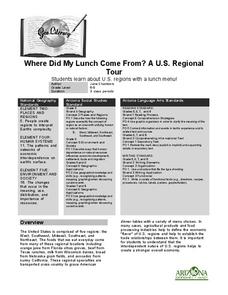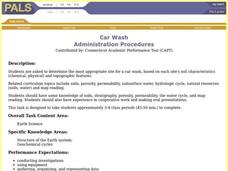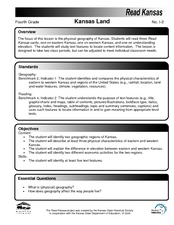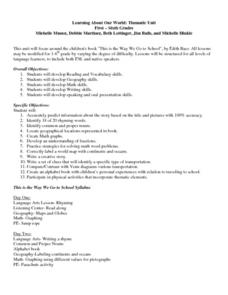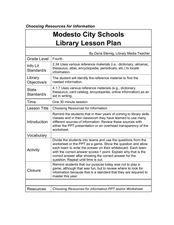Curated OER
The Southeast Region
Students write a song about the southeast region. In this southeast region lesson plan, students view pictures of landforms, hear music, look at maps of states, and more.
Curated OER
Simple Machines
Third graders examine and identify the six types of simple machines. Using a model of each simple machine, they demonstrate the state the function of them to the class. They discover examples of simple machines at school and home and...
Curated OER
Our Friends the Trees
Students explore trees and learn about their importance to the environment. In this tree study lesson, students work in groups to complete a tree survey, a map for the survey, and several worksheets about the tree topics. students make a...
Curated OER
Learning Words
Students listen to Jane Yolen's, All Those Secrets of the World. They engage in activities to find word meanings without using a dictionary. They practice using a vocabulary mapping handout.
Project SMART
Rocks and Minerals: Touch the Earth
Students complete a unit of lessons on rocks and minerals. They conduct research, write e-mail questions to geologists, write daily journal entries, label maps demonstrating types of rocks/minerals found, and create a web page that...
Curated OER
What I Dream For:
Students investigate about the life and work of Martin Luther King Jr., watching video clips from unitedstreaming. They identify ways that they can help make Martin Luther's dream of peace a reality. Pupils identify contributions that...
Curated OER
"Pass the Potatoes" (But, where did they come from?)
Eighth graders explore various cultures around the world. In this cultural instructional activity, 8th graders prepare foods that belong to different cultures. Students examine the climate in the places of origin of their...
Curated OER
Wolves
Learners utilize several different sources to research wolves, after completing the K-W-L process.
Curated OER
The Giver
Middle schoolers read the novel The Giver and complete six tasks. They identify vocabulary that they did not recongize, create a different ending for the book, produce character cards and pick important events and objects from the novel.
Curated OER
International Research Project and Feast
Students research countries around the world. They develop and write a research paper that includes maps, photographs, and diagrams. They describe the culture, society, economy, religious beliefs, government structure, and history of...
Curated OER
It's a Grand Ol' Government!
Students discuss the three branches of government and the different levels. They talk about the purpose of laws and use the Internet to locate information about governments. They watch the video, "United States Constitution" and look up...
Curated OER
Walk Around Ohio
Students walk and accumulate miles in a simulated "walk" around the eighty-eight counties of Ohio. Each class logs an average of twenty miles a week, hanging up a picture of a historic Ohio landmark to represent the different counties...
Curated OER
Region Reality
Eighth graders compare and contrast world regions and explore the theme of world regions. In this world geography lesson, 8th graders name regions in the U.S. and mark them on a map. Students discuss the cultural and physical...
Curated OER
Building from the Ground Up
Third graders research the interdependence of communities within different countries. For this community lesson, 3rd graders create a new community from a preselected country in South America. Students use the findings from their...
Curated OER
Lesson 1 Walk Through and Notes
Fourth graders take notes on a class discussion. For this economy lesson students discuss Indiana's economy over a span of history. The students use a map and a timeline.
Curated OER
Where Did My Lunch Come From? A U.S. Regional Tour
Students explore the regions from which their food comes. In this social studies lesson, students identify the different agricultural products that are found in the major regions of the United States. Students create a lunch menu.
Curated OER
Droughts
Students discuss a natural disaster. In this droughts lesson plan, students discover how droughts occur and how they affect the society dealing with one. They discuss how the population of Australia deals with droughts and work on...
Curated OER
This Is Tanzania
Young scholars begin the lesson by locating Tanzania on a world map. While reading an article, they note what the author's opinion is of the people who live there and discover the connection the people have with the land. They examine...
Curated OER
Car Wash
Students determine the most appropriate site for a car wash, based on each site's soil characteristics (chemical, physical) and topographic features. They perform an experiment to determine the changes to three different soil types when...
Curated OER
A Walk in the Woods
Eighth graders observe and identify the different levels of the forest. In this forest zones lesson students observe, identify and name a variety of forest components and describe how humans impact the forest ecosystem.
Curated OER
Kansas Land
Fourth graders discover the geographic regions of Kansas. In this geography lesson, 4th graders explore the different regions of Kansas and determine how the different geography affects daily life in Kansas.
Curated OER
Learning About Our World
Students explore their world using the book "This is the Way We Go to School." They predict information about the story based on the title and pictures. Students label a world map with the names of continents and oceans. They write a set...
Curated OER
Which reference book helps most?
Fourth graders utilize various reference materials to find specific types of information. In this library research lesson, 4th graders choose the best source of information from the library's reference collection to answer questions.
Curated OER
Tzedakah Begins at Home (Private-Religious)
Young scholars learn about the eight levels of tzedakah or charitable giving. In this philanthropy lesson, students examine the eight levels of charitable giving that were developed by Rabbi Moses Maimonides. They participate in...



